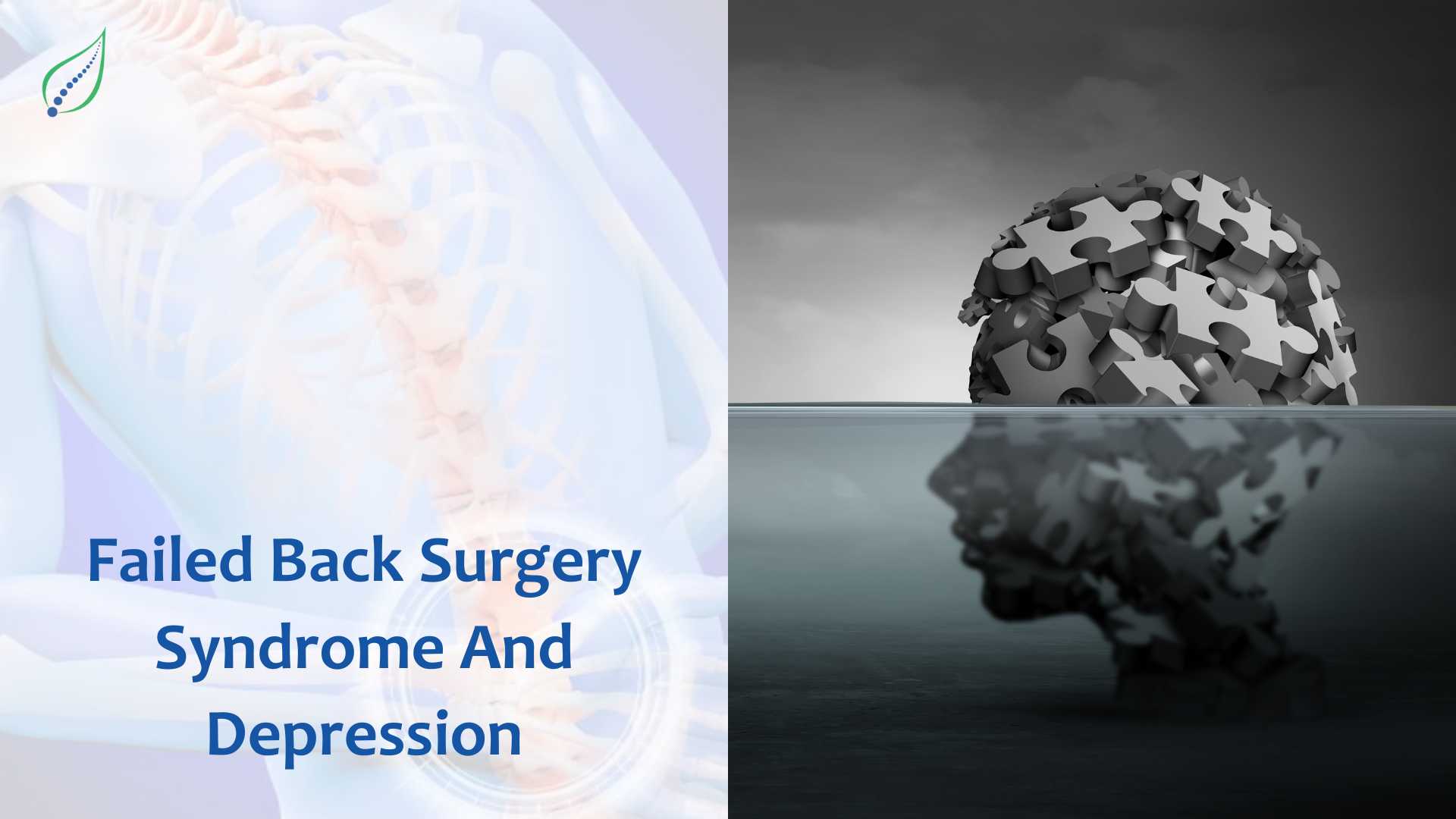Failed Back Surgery Syndrome And Depression
Failed back surgery syndrome (FBSS) is a debilitating condition that affects a significant number of patients who undergo back surgery. It refers to persistent or recurring back and/or leg pain after one or more spine surgeries. Unfortunately, FBSS is relatively common, with some estimates indicating it occurs in 20-40% of patients after lumbar spine surgery.
Living with constant, chronic pain takes an enormous toll on one's physical and mental health. It is not surprising, then, that depression is very prevalent among those with FBSS. Research shows that depression rates in back surgery patients with continuing pain are 85% or higher. This blog post will explore the connections between FBSS and depression, including contributing factors and management strategies.
Causes of Depression in FBSS Patients
There are several reasons why FBSS often leads to depression. First and foremost is the challenge of coping with severe, unremitting pain that disrupts every aspect of life. The pain prevents normal physical functioning and serves as a constant reminder of loss - loss of the ability to work, engage in hobbies, participate in family life, and more. Lack of restorative sleep and fatigue brought on by pain only make matters worse. In addition, people with chronic pain often have to take medications long-term, which can interfere with mental acuity.
The changes FBSS brings to one's work and financial situation also commonly trigger depression. Most patients are unable to continue working due to pain and functional limitations. The loss of independence and the ability to earn an income is a huge blow. Added financial stressors due to the loss of a job or mounting medical costs frequently contribute to feelings of depression.
It is extremely difficult for FBSS patients to come to terms with the fact that surgery, something that was supposed to help, has instead contributed to more pain and upheaval. The sense of disappointment and lost hope for improvement weigh heavily on one's mindset. Furthermore, depression often stems from the loss of the life and abilities people had before FBSS occurred. Isolation and loneliness frequently ensue as normal social interactions and relationships become impaired.
How Depression Affects FBSS Patients?
FBSS patients with depression tend to experience more intense and constant pain compared to those without depressive disorders. Research indicates that depression amplifies pain signalling between the body and brain. Also, depression and pain share some of the same neurotransmitters and pathways, so abnormalities in the transmission of signals that regulate mood may heighten pain perception.
Depression has a detrimental impact on a patient's ability to cope with and manage pain. Individuals who are depressed lack the motivation and the energy to adhere to treatment plans, engage in physical therapy, or use cognitive behavioural techniques to better control pain. They are less able to perform self-care and more likely to abuse medications and other substances in an attempt to numb emotional and physical pain.
Those with depression may magnify gloomy thoughts and interpret events in an overly negative manner. Pessimism replaces hope and leads to giving up on finding solutions. Depressed FBSS patients are more likely to withdraw socially and emotionally, which fuels further feelings of loneliness and low self-worth.
Overall, research indicates significantly worse pain, disability, and quality of life scores for FBSS patients with co-existing depression compared to those without clinical depression. However, early recognition and multidisciplinary treatment approaches can substantially improve both mood and pain management.
Assessing for Depression in FBSS Patients
It is critical that doctors routinely screen FBSS patients for depression to facilitate early intervention. There are several reliable and validated questionnaires physicians can use, such as:
- Patient Health Questionnaire-9 (PHQ-9): widely used to grade depression severity
- Hospital Anxiety and Depression Scale: identifies cases of anxiety and depression
- Beck Depression Inventory: one of the most common depression rating scales
Of course, a diagnostic interview by a psychiatrist or psychologist provides the most thorough evaluation. Doctors diagnosing depression also need to explore factors that could be contributing, including:
- Medications: opioids, muscle relaxants, and other drugs used for pain control can lead to depressive symptoms as side effects
- Sleep disturbances: disrupted sleep from pain can exacerbate depressed mood
- Substance abuse: drinking alcohol or taking prescription drugs in excess to cope with FBSS
- Co-occurring medical conditions: diabetes, heart disease, arthritis and others may predispose patients to depression
- History of mental illness: previous depressive episodes make recurrent episodes more likely
Treating the Whole Patient: Integrated Care for Concurrent Pain and Depression
In years past, pain management focused narrowly on physical pathology without much consideration of psychosocial influences. Similarly, mental healthcare tended to ignore physical symptoms like pain. Yet today, we recognize the close interplay between mind and body. Treating chronic pain and depression requires a more holistic, integrated approach.
For FBSS patients with co-existing depression, a multidisciplinary pain rehabilitation program is the gold standard. This intensive 3-4 week outpatient program utilizes diverse techniques to target pain and mood concurrently. Patients receive medical care from doctors alongside psychological counselling, physical therapy, biofeedback training, and more.
Providing emotional support through empathy, compassion, and reassurance is equally essential. Support groups allow patients to share experiences and advice, decreasing isolation. Family counselling guides loved ones on how to nurture without enabling pain behaviours. Finally, maintaining a healthy lifestyle through eating nutritious foods, abstaining from smoking, getting good sleep, and staying socially connected can help minimize depressive symptoms.
Bottom Line
In summary, FBSS frequently coincides with clinical depression, exacerbating disability and suffering. Using screening tools to identify at-risk individuals is key. A biopsychosocial approach that integrates both physical and emotional aspects of care offers the best opportunity for improving pain and function in this depressed patient population. While FBSS is a challenging condition, patients who take advantage of the many resources available can go on to experience joy and meaning in their lives once again.


_1747226427_1751827070.png)
_1744793045_1751827442.png)
